Some thoughts about surviving the zombie apocalypse and a couple of leadership lessons that are taken from that. A conversation recorded between Jonathan McCrea and I, in the leading science radio program in Ireland: Newstalk.
Insights from where it matters
On the research, writing & corporate services of Markus Hällgren
Some thoughts about surviving the zombie apocalypse and a couple of leadership lessons that are taken from that. A conversation recorded between Jonathan McCrea and I, in the leading science radio program in Ireland: Newstalk.
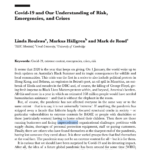 Some time ago, Linda Rouleau, Mark De Rond, and I had our article.. published in Journal of Management Studies. Hopefully, researchers become interested in extreme contexts, or it helps to articulate some interesting aspects for researchers that are already interested in extreme contexts. You find the article here: https://onlinelibrary.wiley.com/doi/pdf/10.1111/joms.12649
Some time ago, Linda Rouleau, Mark De Rond, and I had our article.. published in Journal of Management Studies. Hopefully, researchers become interested in extreme contexts, or it helps to articulate some interesting aspects for researchers that are already interested in extreme contexts. You find the article here: https://onlinelibrary.wiley.com/doi/pdf/10.1111/joms.12649
 Today, while walking the dog, I opened my email and found out that David Buchanan and my article “The dark side of group behavior: Zombie apocalypse lessons” is accepted for publication in Academy of Management Perspectives (http://aom.org/Publications/AMP/Academy-of-Management-Perspectives.aspx) . Abstract below.
Today, while walking the dog, I opened my email and found out that David Buchanan and my article “The dark side of group behavior: Zombie apocalypse lessons” is accepted for publication in Academy of Management Perspectives (http://aom.org/Publications/AMP/Academy-of-Management-Perspectives.aspx) . Abstract below.
Abstract:
 How will groups of survivors behave in a doomsday scenario? Will there be competition for scarce resources? Will they collaborate in reconstruction? We cannot research these questions directly, but we can find clues in four places. First, there are historical examples of apocalyptic events. Second, social identity theory offers explanations of group behavior. Third, there are studies of group dynamics in extreme contexts. We discuss the limitations of those three sources, prompting us to turn to a fictional account in search of ideas. Adopting a narrative theoretical lens, we consider ‘the theory on offer’ in the television series The Walking Dead, which portrays a zombie apocalypse. We find that group behavior is shaped by the nature of survivor group composition, and by the properties of the doomsday context they face. We demonstrate the potential for the emergence of a dark, violent side of group behavior. We illustrate a methodological solution to the problem of researching extreme contexts using ‘speculative fiction’. And we break new ground by exploiting the zombie movie genre, which addresses the ‘failure of imagination’ that can increase society’s vulnerability to unforeseen events. Our analysis has implications for organization theory, and for policy and practice in doomsday scenarios.
How will groups of survivors behave in a doomsday scenario? Will there be competition for scarce resources? Will they collaborate in reconstruction? We cannot research these questions directly, but we can find clues in four places. First, there are historical examples of apocalyptic events. Second, social identity theory offers explanations of group behavior. Third, there are studies of group dynamics in extreme contexts. We discuss the limitations of those three sources, prompting us to turn to a fictional account in search of ideas. Adopting a narrative theoretical lens, we consider ‘the theory on offer’ in the television series The Walking Dead, which portrays a zombie apocalypse. We find that group behavior is shaped by the nature of survivor group composition, and by the properties of the doomsday context they face. We demonstrate the potential for the emergence of a dark, violent side of group behavior. We illustrate a methodological solution to the problem of researching extreme contexts using ‘speculative fiction’. And we break new ground by exploiting the zombie movie genre, which addresses the ‘failure of imagination’ that can increase society’s vulnerability to unforeseen events. Our analysis has implications for organization theory, and for policy and practice in doomsday scenarios.
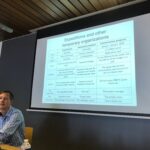 I have the pleasure of spending a week at IEA by the invitation of Yvonne Giordano. In addition to exploring shared research interests and collaborations, I have given a talk on how I came to “explore the Extreme to understand the normal”. Trying to make sense of this was an interesting thought process, to say the least!
I have the pleasure of spending a week at IEA by the invitation of Yvonne Giordano. In addition to exploring shared research interests and collaborations, I have given a talk on how I came to “explore the Extreme to understand the normal”. Trying to make sense of this was an interesting thought process, to say the least!
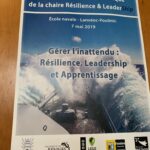 Earlier this week I was invited by the Chair of Resilience and LeaderShip to give a presentation at Ecole de Navale in Brest. I talked about the research on Boredom on Mount Everest and how that is mitigated by organizational routines. The effect is a more cohesive and efficient team. It was a very interesting event with a mix of military, private/public organizations and scholars. Professor John Carroll of MIT also gave a talk about how to build resilient organizations out of a framework of organizational design, culture and politics. Other presenters included how French Special forces dealt with crisis situations and built their team cohesiveness. Interestingly, movie nights turned out to be universal between Sea to Summit.
Earlier this week I was invited by the Chair of Resilience and LeaderShip to give a presentation at Ecole de Navale in Brest. I talked about the research on Boredom on Mount Everest and how that is mitigated by organizational routines. The effect is a more cohesive and efficient team. It was a very interesting event with a mix of military, private/public organizations and scholars. Professor John Carroll of MIT also gave a talk about how to build resilient organizations out of a framework of organizational design, culture and politics. Other presenters included how French Special forces dealt with crisis situations and built their team cohesiveness. Interestingly, movie nights turned out to be universal between Sea to Summit.
 Häromveckan hade jag det stora nöjet att hålla ett föredrag vid “EGA-dagarna” för företaget EGA rörande “Riskhantering i Extrema miljöer”. Ett hundratal personer från främst byggindustrin deltog i det supertrevliga arrangemanget. De andra föreläsarna var väldigt intressanta och belyste mängder av aspekter kopplat till byggindustrin och dess säkerhet. Förhoppningsvis går det att spinna vidare på i någon form då det är en väldigt relevant fråga i en industrin som omsätter väldigt mycket pengar. En av aspekterna är intressant nog företeelsen att inte använda säkerhetsutrustning, vilket kan liknas vid sherpor på Everest som allt som oftast inte använder säkerhetslinor trots att det finns tillgängligt.
Häromveckan hade jag det stora nöjet att hålla ett föredrag vid “EGA-dagarna” för företaget EGA rörande “Riskhantering i Extrema miljöer”. Ett hundratal personer från främst byggindustrin deltog i det supertrevliga arrangemanget. De andra föreläsarna var väldigt intressanta och belyste mängder av aspekter kopplat till byggindustrin och dess säkerhet. Förhoppningsvis går det att spinna vidare på i någon form då det är en väldigt relevant fråga i en industrin som omsätter väldigt mycket pengar. En av aspekterna är intressant nog företeelsen att inte använda säkerhetsutrustning, vilket kan liknas vid sherpor på Everest som allt som oftast inte använder säkerhetslinor trots att det finns tillgängligt.
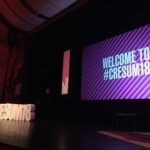 Had the pleasure and honor to stand on the #Cresum18 scene the other day. The Creative summit is a “mixture of a conference, workshop, party and some very secret ingredients that we are not allowed to mention. We have been around since way back in 2007. Older than most of the ideas, innovations, technology and businesses that we usually share ideas around. It all takes place under the midnight sun in the north of Sweden.” (https://www.creativesummit.org) Together with a bunch of extremely interesting we talked about the future of work. While they had a positive tone to it, I could not avoid to nuance it slightly, suggesting that the current trend in society may foster more boredom, less engagement and more problems for any type of organization. And yes, it was indeed a good party too!
Had the pleasure and honor to stand on the #Cresum18 scene the other day. The Creative summit is a “mixture of a conference, workshop, party and some very secret ingredients that we are not allowed to mention. We have been around since way back in 2007. Older than most of the ideas, innovations, technology and businesses that we usually share ideas around. It all takes place under the midnight sun in the north of Sweden.” (https://www.creativesummit.org) Together with a bunch of extremely interesting we talked about the future of work. While they had a positive tone to it, I could not avoid to nuance it slightly, suggesting that the current trend in society may foster more boredom, less engagement and more problems for any type of organization. And yes, it was indeed a good party too!
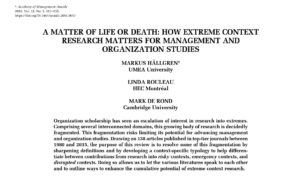 The R3 research group stands for Risk, Resilience and Reliability. It is a newly formed interdisciplinary network that currently is organized by Amy Fraher and Mark Hall at Birmingham University. I was invited to present my, Linda Rouleau´s and Mark de Rond´s Annals paper on extreme contexts. It was a great seminar with plenty of interesting thoughts and discussions following presentations by senior and junior scholars alike.
The R3 research group stands for Risk, Resilience and Reliability. It is a newly formed interdisciplinary network that currently is organized by Amy Fraher and Mark Hall at Birmingham University. I was invited to present my, Linda Rouleau´s and Mark de Rond´s Annals paper on extreme contexts. It was a great seminar with plenty of interesting thoughts and discussions following presentations by senior and junior scholars alike.
 The other day Linda Rouleau, Mark de Rond and mine paper “A Matter of Life or Death: How Extreme Context Research Matters for Management and Organization Studies” was published in the Academy of Management Annals journal. It was a lot of hard work so they are really pleased to finally see it in print. Hopefully it will make a difference in how we conceptualize, theorize and approach extreme contexts in the future. Naturally I am kind of happy about this and somewhat proud..
The other day Linda Rouleau, Mark de Rond and mine paper “A Matter of Life or Death: How Extreme Context Research Matters for Management and Organization Studies” was published in the Academy of Management Annals journal. It was a lot of hard work so they are really pleased to finally see it in print. Hopefully it will make a difference in how we conceptualize, theorize and approach extreme contexts in the future. Naturally I am kind of happy about this and somewhat proud..
You find the article here or you can email me on markus.hallgren(at)umu.se if you´d like a copy. Please share with others that you think might be interested!
Abstract
Organization scholarship has seen an escalation of interest in research into extremes. Comprising several interconnected domains, this growing body of research is decidedly fragmented. This fragmentation risks limiting its potential for advancing management and organization studies. Drawing on 138 articles published in top-tier journals between 1980 and 2015, the purpose of this review is to resolve some of this fragmentation by sharpening definitions and by developing a context-specific typology to help differentiate between contributions from research into risky contexts, emergency contexts, and disrupted contexts. Doing so allows us to let the various literatures speak to each other and to outline ways to enhance the cumulative potential of extreme context research.
Today we received the news that we have received funding from Riksbankens Jubileumsfond for a research exchange program addressing the grand challenges of today. Please find the summary in Swedish and English below.
Sammanfattning på svenska
Programmets syfte är att skapa en plattform för samarbete samt ökad lokal exponering för internationell organisationsforskning i toppklass. Utbytet är ett led i att utveckla den teoretiska och metodologiska kompetens som stora samhällsutmaningar kräver. Nio forskare som samtliga är experter på sitt respektive område har bjudits. Varje inbjuden forskare följer förutbestämda aktiviteter kopplade till programmets övergripande syfte. Forskningsutbytet arrangeras av forskningsmiljön TripleED vid managementsektionen på Handelshögskolan, och sker i samarbete med två forskningsprofiler vid två andra institutioner på Umeå universitet.
Summary in English
The purpose of the research exchange is to create a platform for collaboration, and locally increase the exposure to international top-level organization theory research. The exchange is part of a larger strategy to develop the theoretical and methodological competence that is required to take on the grand challenges of today’s society. Nine scholars that are experts in their field are invited. Each visit will include pre-set activities associated with the purpose of the exchange program. The exchange is organized by the Extreme Environments – Everyday Decisions research environment at the management section at Umeå School of Business and Economics, Umeå university in collaboration with two research profiles at other departments on Umeå University.